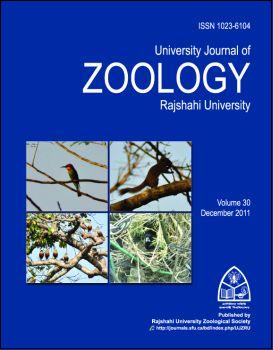Present status and fish seed production of the hatcheries of six upazilas of Rajshahi District
DOI:
https://doi.org/10.3329/ujzru.v30i0.10743Keywords:
Hatchery, fish seed production, induced breeding, inducing agents, fish fry.Abstract
An investigation was conducted during the period from March to December, 2009 to know the status and fish seed production of the hatcheries of six upazilas of Rajshahi district. All the hatcheries were established during 1968 to 2003. The occupations of the hatchery owners are hatchery business and others. Training status of the hatchery owners shows that in maximum cases they had no training and other cases had short term training, consulting with UFO etc. Funding source was self and loan, land ownership was own and lease. Fish disease occurs seldomly. The area of hatchery buildings ranged from 5 to 33 decimals. The water carrying capacity of overhead tanks ranged from 9091.90 to 409135.5 liter. The volume of each cistern ranged from 1.73 m3 to 3.93 m3. The volume of circular breeding and hatching tanks, varied from 2.48 m3 to 4.02 m3 and 1.72 m3 to 3.14 m3. The volume of each incubation tank (bottle) ranged from 1.52 m3 to 1.08 m3. The number of permanent workers ranged from 2 to 6 in all seasons. Six native species (rui, catla, mrigel, calibaush, bata and gonia) and six exotic species (silvercarp, bighead carp, grass carp, common carp, Thai pangus and Thai puti) were used for seed production. Two types of hormonal injections, such as Pituitary Gland (PG) and Human Chorionic Gonadotropin (HCG) were used for this purpose. Average fry production were for rui, 140.38 ± 127.02 kg, catla, 37.25 ± 29.24 kg, mrigel, 105.63 ± 54.84 kg, calibaush, 13.50 ± 5.75 kg, gonia, 32 ± 0 kg, bata, 166 ± 113.27 kg, silvercarp, 132.38 ± 96.32 kg, bighead carp, 120.71 ± 116.62 kg, grass carp, 31 ± 11.53 kg, common carp, 140.83 ± 93.83 kg, Thai pangus, 10 ± 0 kg, Thai puti, 42.33 ± 33.71 kg was recorded in some surveyed private hatcheries. The total fry production in some surveyed hatcheries ranged from 85 to 1698 kg with an average of 662.75 ± 513.83 kg.
DOI: http://dx.doi.org/10.3329/ujzru.v30i0.10743
Univ. j. zool. Rajshahi Univ. Vol. 30, 2011 pp. 29-32
Downloads
173
1299

